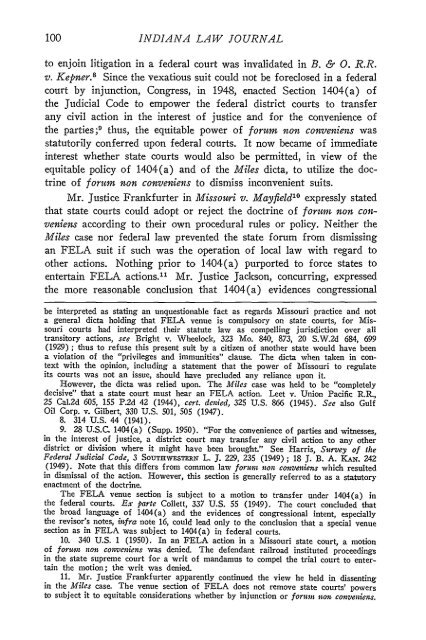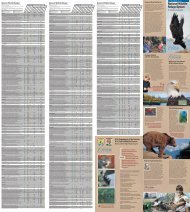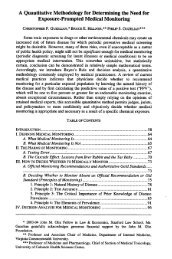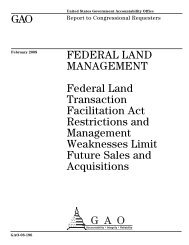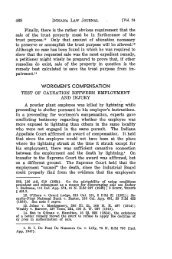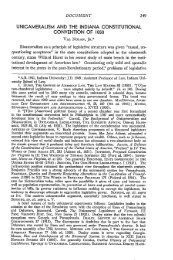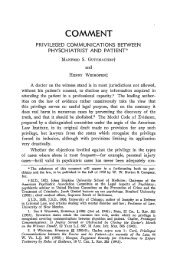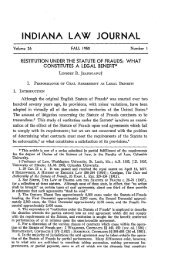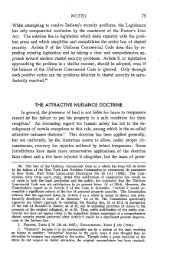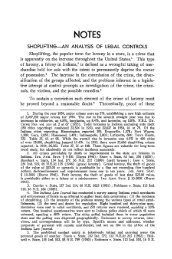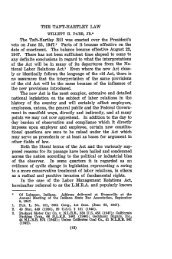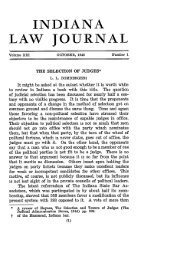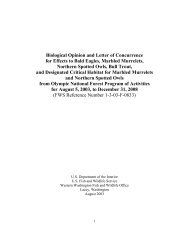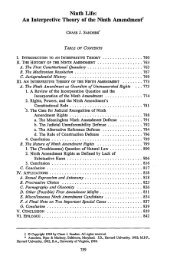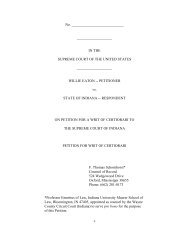fela venue abuse: necessity for congressional amendment
fela venue abuse: necessity for congressional amendment
fela venue abuse: necessity for congressional amendment
You also want an ePaper? Increase the reach of your titles
YUMPU automatically turns print PDFs into web optimized ePapers that Google loves.
INDIANA LAW JOURNAL<br />
to enjoin litigation in a federal court was invalidated in B. & 0. R.R.<br />
v. Kepner. 8 Since the vexatious suit could not be <strong>for</strong>eclosed in a federal<br />
court by injunction, Congress, in 1948, enacted Section 1404(a) of<br />
the Judicial Code to empower the federal district courts to transfer<br />
any civil action in the interest of justice and <strong>for</strong> the convenience of<br />
the parties;9 thus, the equitable power of <strong>for</strong>um non conveniens was<br />
statutorily conferred upon federal courts. It now became of immediate<br />
interest whether state courts would also be permitted, in view of the<br />
equitable policy of 1404(a) and of the Miles dicta, to utilize the doctrine<br />
of <strong>for</strong>um non conveniens to dismiss inconvenient suits.<br />
Mr. Justice Frankfurter in Missouri v. Mayfield' ° expressly stated<br />
that state courts could adopt or reject the doctrine of <strong>for</strong>um non conveniens<br />
according to their own procedural rules or policy. Neither the<br />
Miles case nor federal law prevented the state <strong>for</strong>um from dismissing<br />
an FELA suit if such was the operation of local law with regard to<br />
other actions. Nothing prior to 1404(a) purported to <strong>for</strong>ce states to<br />
entertain FELA actions. 11 Mr. Justice Jackson, concurring, expressed<br />
the more reasonable conclusion that 1404(a) evidences <strong>congressional</strong><br />
be interpreted as stating an unquestionable fact as regards Missouri practice and not<br />
a general dicta holding that FELA <strong>venue</strong> is compulsory on state courts, <strong>for</strong> Missouri<br />
courts had interpreted their statute law as compelling jurisdiction over all<br />
transitory actions, see Bright v. Wheelock, 323 Mo. 840, 873, 20 S.W.2d 684, 699<br />
(1929) ; thus to refuse this present suit by a citizen of another state would have been<br />
a violation of the "privileges and immunities" clause. The dicta when taken in context<br />
with the opinion, including a statement that the power of Missouri to regulate<br />
its courts was not an issue, should have precluded any reliance upon it.<br />
However, the dicta was relied upon. The Miles case was held to be "completely<br />
decisive" that a state court must hear an FELA action. Leet v. Union Pacific R.R.,<br />
25 Cal.2d 605, 155 P.2d 42 (1944), cert. denied, 325 U.S. 866 (1945). See also Gulf<br />
Oil Corp. v. Gilbert, 330 U.S. 501, 505 (1947).<br />
8. 314 U.S. 44 (1941).<br />
9. 28 U.S.C. 1404(a) (Supp. 1950). "For the convenience of parties and witnesses,<br />
in the interest of justice, a district court may transfer any civil action to any other<br />
district or division where it might have been brought." See Harris, Survey of the<br />
Federal Judicial Code, 3 SOUTHWESTERN L. J. 229, 235 (1949); 18 J. B. A. KAN. 242<br />
(1949). Note that this differs from common law <strong>for</strong>umo non conveniens which resulted<br />
in dismissal of the action. However, this section is generally referred to as a statutory<br />
enactment of the doctrine.<br />
The FELA <strong>venue</strong> section is subject to a motion to transfer under 1404(a) in<br />
the federal courts. Ex parte Collett, 337 U.S. 55 (1949). The court concluded that<br />
the broad language of 1404(a) and the evidences of <strong>congressional</strong> intent, especially<br />
the revisor's notes, infra note 16, could lead only to the conclusion that a special <strong>venue</strong><br />
section as in FELA was subject to 1404(a) in federal courts.<br />
10. 340 U.S. 1 (1950). In an FELA action in a Missouri state court, a motion<br />
of <strong>for</strong>um non conveniens was denied. The defendant railroad instituted proceedings<br />
in the state supreme court <strong>for</strong> a writ of mandamus to compel the trial court to entertain<br />
the motion; the writ was denied.<br />
11. Mr. Justice Frankfurter apparently continued the view he held in dissenting<br />
in the Miles case. The <strong>venue</strong> section of FELA does not remove state courts' powers<br />
to subject it to equitable considerations whether by injunction or <strong>for</strong>um non conveniens.


